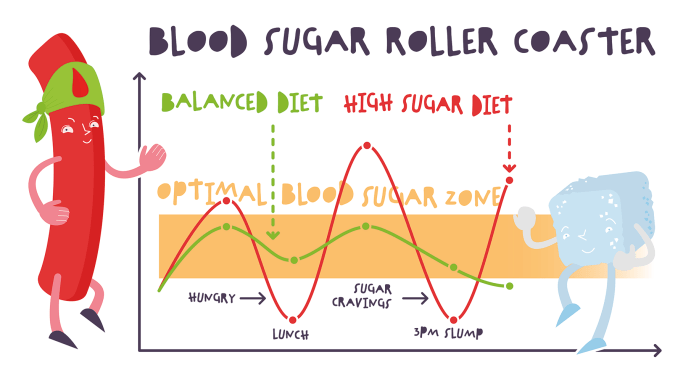Sugar works in a very subtle way. It always leaves you wanting more! Before you know it, you wake up struggling with health issues. And it becomes “extra bad” for women in menopause!
Experts say that too much sugar increase blood sugar levels (I bet you know that already), but only a few are aware that high blood sugar can worsen menopause discomforts! Excessive sugar intake also brings a negative impact on our immune system, gut health, metabolism, brain health, blood pressure, cholesterol levels, oral health and overall resistance against diseases!
So, brace yourself — this article will not be sugarcoated, because not a single corner inside our body is left unharmed by sugar! They say sugar is every woman’s “best friend”, but wait until you finish this article! You will realize that sugar is actually your NUMBER ONE enemy.
Alright, maybe I need to calm down now, but I didn’t write this to scare you. I just don’t want to hide the ugly facts and leave my midlife ladies clueless!
Read on, so you’ll understand why reducing your sugar intake is going to be a life-changing decision! Your body and health will thank you for doing yourself this BIG favor. Get ready to unmask and arrest this guilty culprit! Sugar, it’s game over.


Table of Contents
What is Sugar?
Sugar is a form of carbohydrate that the body converts to glucose. Once broken down, it becomes a source of energy for our body.
Sounds pretty harmless, right? Unfortunately, sugar is sneaked in EVERYWHERE. I mean, yes, it feeds our feel-good hormones and who doesn´t want to feel good, right? But, here’s the thing: Do you think food manufacturers put our health on top of their list? Think again!


At IKEA, for example, they are selling a product called “Belöning” — a Swedish word that literally means “reward”. Don’t you find it strange that even if their main business is furniture retailing, they still go the extra mile to connect sweets with our emotions? What a sneaky, tricky way to make us buy, eat and be more dependent on sugar!
We didn’t even have sugar-rich foods on the market before. Now, they are everywhere! So, be careful with the products you grab. Anything with too much sugar is not intended to be the fuel for our body. It’s a toxin!
We can’t continue eating things that harm our body and still think that the body will work for us. Yes, sugar is everywhere, but YOU still make your own conscious decisions! That’s pretty much like driving in your street every day. Just because you’re used to it doesn’t mean you won’t slow down and pay attention to the road signs.
Food companies, product labels, government regulations — NONE of them will look after your personal health. YOU call the shots on the products you buy and the food you eat!
Sugar Addiction in Midlife: Is It Real?
Yes — sugar addiction is REAL. Many women have told me that on their way home from work, they just have to stop and get something sweet. Some also say that they always bring a piece of chocolate bar or any sweet treat in their bag — as if it would be a first-aid cure for any menopause discomfort!
But why is that? Why are so many midlife women addicted to sugar?
Well, in a more general sense, it’s because of the “dopamine kick”. Dopamine is a neurotransmitter released when you take a bite of delicious food, when you have sex, after you exercise and when you have enjoyable social interactions. Now, eating sugary foods causes our dopamine levels to surge. This “feel-good, rewarding feeling” effect of sugar on our dopamine receptors makes it addictive. That is also the reason why it is often so difficult to eliminate sugar from our diet!
New research found that sugar intake alters the reward-processing ability of the brain in a similar way to opioid and heroin. Yup — those are dangerously addictive drugs!
Another evidence showed that eating sugar produces a feeling of “dependency” or “food addiction”.
Now, what makes women more susceptible to sugar addiction in menopause?
Let’s say you have unexplained fatigue, stress, brain fog and a rollercoaster of emotions. These are among the many symptoms of menopause brought by fluctuating hormonal levels. Our body would then search for a source of energy to combat these discomforts! Apparently, it is dietary carbohydrates and sugar which the body can readily convert into “fuel” or energy. So, during days when you’re exhausted, not feeling your best and in need of “comfort”, sugar cravings start to become unmanageable.
Blood sugar imbalance is the biggest factor behind sugar addiction in menopause. Remember, everything is connected inside our body. Our hormones, neurotransmitters and the nutrients from the food we eat must be in the right amounts to achieve a state of balance. If they are too high or too low, their intended purpose for our body will be defeated! Worse, any imbalance can create a domino effect, from one health condition to another.
If you have high blood sugar levels (hyperglycemia), it means there’s excess glucose in the bloodstream. Too much glucose cannot be utilized for immediate energy or storage, which in the long run leads to insulin resistance (IR).
Here’s a quick review about IR: Insulin, the hormone produced by the pancreas, is responsible for regulating blood sugar (glucose) in the body. When our body detects a spike in blood sugar levels, it signals the pancreas to release insulin and regulate the amount of glucose detected in the bloodstream. If there’s a lot of blood sugar entering the bloodstream, the pancreas pumps out more insulin to help blood sugar enter the cells. Over time, cells stop responding to all the insulin — making them resistant. The pancreas will keep making more insulin to try to make cells respond. Eventually, the pancreas can’t keep up and blood sugar keeps rising. You see, insulin resistance is only one of the dangers of high blood sugar levels! If left untreated, hyperglycemia can also increase your risk of heart disease, stroke, diabetes, kidney disease, vision problems and nerve problems.
In contrast, having low blood sugar after eating is often called “reactive hypoglycemia”. It happens when there isn’t enough glucose circulating in the blood. Low blood sugar typically occurs in people with diabetes, as well as those with normal blood sugar levels when fasting. It can also be dangerous, as it may be due to a serious underlying medical condition — such as an eating disorder or a tumor.


Remember this: Every time you reach for a sweet fix, you’re only setting yourself up for a “sugar high”. Obviously, it’s not a long-term solution! The “ecstatic” feeling will eventually crash and you will only be stuck in an unhealthy cycle!
Always go back to the root cause of your symptoms, love! I will give you great tips to prevent sugar cravings further down, but watch this video from Ted Ed first! You will learn more about how sugar affects the brain, as explained by Dr. Nicole Avena — a research neuroscientist and expert in nutrition, diet and addiction:
“Pleasure (reward) is the emotional state where your brain says: This feels good—I want more. While happiness (contentment) is the emotional state where your brain says: This feels good—I don’t want or need any more.”
― Dr. Robert H. Lustig
Why Every Woman in Menopause Should Stop Eating Sugar
The convenience and availability of processed foods are often sky-high in sugar. Why should we worry about this exactly?
Here are 14 reasons why you should eliminate sugar from your diet!
- Sugar Leads to Inflammation
- Sugar Spikes Blood Pressure
- Sugar Raises Bad Cholesterol Levels
- Sugar Increases the Risk of Cardiovascular Disease
- Sugar Triggers Weight Gain, Obesity and Metabolic Problems
- Sugar Triggers Liver Disease
- Sugar Causes Insulin Resistance
- Sugar Increases the Risk of Diabetes
- Sugar Results in Cognitive Decline
- Sugar Induces Gut Problems
- Sugar Negatively Affects Joint and Muscle Health
- Sugar Results in Oral and Dental Problems
- Sugar May Lead to Osteoporosis
- Sugar Weakens the Immune System
Now, let’s talk about heart health. Dr. Frank Hu, Professor of Nutrition at the Harvard T.H. Chan School of Public Health, said that sugar appears to have an indirect impact on cardiovascular health:
“Your liver metabolizes sugar the same way as alcohol, and converts dietary carbohydrates to fat. Over time, this can lead to a greater accumulation of fat, which may turn into fatty liver disease — a contributor to diabetes, which raises your risk for heart disease.” – Dr. Hu
Consumption of too much added sugar can also increase chronic inflammation and raise blood pressure — which are both dangerous pathways to heart disease! Excessive sugar intake also contributes to weight gain, as sugar obstructs your body’s appetite-control system.
“The effects of added sugar intake — higher blood pressure, inflammation, weight gain, diabetes, and fatty liver disease — are all linked to an increased risk for heart attack and stroke.” – Dr. Hu
Moreover, too much glucose consumption leads to memory and cognitive deficiencies! Sugar also negatively affects our neurotransmitters which can result in sugar addiction (as we’ve mentioned earlier). For one, dopamine is a neurotransmitter responsible for our mood, behavior, learning and memory. So, when you give sugar a chance to disrupt the balance of your dopamine levels, all these processes will also be out of whack! Drug addiction and Parkinson’s disease are some examples of conditions associated with disrupted dopamine levels.
Are you starting to taste the bitterness of sugar now?
I watched this video from Dr. Jody Stanislaw as she dives into the widespread negative effects of sugar. Dr. Jody is a Naturopathic Doctor who has been studying the detrimental effects of sugar and what you can do about it. Get inspired and learn from her eye-opening talk!
“I visited the doctor today and he said my sugar was too high. So, I came home and moved it to a lower shelf.”
How to Fight Sugar Cravings in Menopause
Despite the irresistible urge to feel some sugar rushing through your veins, there are many ways to put an end to it! Embrace the following habits to fight sugar cravings:
► Cut back on foods that contain refined sugar (like cereals, yoghurts, confectionery, cakes, biscuits, puddings and more)!
►Consume more protein and healthy fats!
► Take probiotics to improve gut health and prevent bacterial growth that can intensify sugar cravings!
► Practice mindful eating to improve your relationship with food (and end up eating less)!
► Embrace the wonders of intermittent fasting!
► Swap milk chocolate for dark chocolate!
► Limit caffeine to only one cup of tea or coffee each day!
► Keep hydrated — thirst is easily confused with hunger!
► Eat low-carb foods and be amazed with the results!
You see, the hormonal changes going on throughout your body are creating a big need for extra nutrition. You need more vitamins, more minerals and a lot more protein to keep everything in balance! So, healthy eating is vital to fight sugar cravings. Watch this video from Dr. Becky Gillaspy to discover more ways to break free from sugar!
Moreover, pay attention to the quality of your sleep! Since a lack of sleep and blood sugar levels are closely linked, it makes sense that not sleeping well can raise blood sugar levels. Therefore, always strive for an abundant and good quality of sleep!
You can also try the help of an app! Mobile apps are now available to help you avoid going over the recommended daily sugar consumption. It calculates how much sugar you eat each day and compares it with the average. Some can even track a bunch of metrics, like insulin levels, carbohydrates and blood sugar levels!
Or buy a glucometer! I have one myself! To capture accurate results, it’s best to test one to two hours after eating. It’s a great device to help you know what specific foods may spike your blood glucose levels!
Lastly, be more aware of your emotional triggers for eating. Sugar is not the way to go for stress and emotionally-charged situations! Overindulging in sweets to cope with stress has long-term physical and emotional consequences. Oh, that’s double trouble! So, the next time you pick up a “comfort food,” STOP and ask yourself why you’re reaching for it. That’s how we do it, ladies.
What are the Different Names of Sugar?
There are 60+ identified names for sugar. Be watchful of its aliases!
- Sucrose: This is just your table sugar, which is extracted from sugar cane or sugar beets. It is made of 50% glucose and 50% fructose.
- Glucose: It’s a type of sugar you get from food. When sugar travels through your bloodstream to your cells, it’s called “blood glucose” or “blood sugar”.
- Fructose: A type of sugar that is metabolized almost entirely in the liver. That’s like making your liver work overtime without pay!
- High Fructose Corn Syrup (HFCS): Oh, this widely used sweetener! It consists of varying amounts of fructose and glucose, but the composition is just the same as sucrose or table sugar!
- Agave Nectar or Agave Syrup: It is a very popular sweetener used in many “health foods” like fruit bars, cereal bars and sweetened yogurts. The reality? It contains about 70–90% fructose and 10–30% glucose!
- More sugar names you must be aware of: Beet sugar, blackstrap molasses, brown sugar, buttered syrup, cane juice crystals, cane sugar, caramel, carob syrup, castor sugar, coconut sugar, confectioner’s sugar, date sugar, demerara sugar, Florida crystals, fruit juice, fruit juice concentrate, golden sugar, golden syrup, grape sugar, honey, icing sugar, invert sugar, maple syrup, molasses, muscovado sugar, panela sugar, rapadura, raw sugar, refiner’s syrup, Sorghum syrup, sucanat, treacle sugar, turbinado sugar, yellow sugar, barley malt, brown rice syrup, corn syrup, corn syrup solids, dextrin, dextrose, diastatic malt, ethyl maltol, glucose, glucose solids, lactose, malt syrup, maltodextrin, maltose, rice syrup
These different names make it EASY for manufacturers to hide how much sugar is present in a product, while it makes it HARD for us to know! ?
Also, the growing use of “alternative” sweeteners makes it difficult to determine which ingredients count as sugar. C’mon, these sugar “alternatives” are just as dangerous to your health as any kind of sugar!
So, what’s a good rule of thumb to avoid menopause symptoms triggered by sugar?
Skip products that list “sugar” as the first or second ingredient! Stay on guard by getting rid of prepackaged foods in favor of whole foods like fresh fruits, vegetables, seeds and nuts!
Also, when you buy ready-made foods, read nutrition labels properly. If you truly know how much sugar is in a product, you can limit how much you eat!
Moreover, drink water or tea instead of sodas and sports drinks. The added sugar in these beverages is worse than many solid food sources in terms of nutrition and hunger satisfaction!
Further down, I will share more tips to fight sugar cravings in menopause. Make sure to get to that part, sweetie! For now, watch this video from Dr. Eric Berg, as he reveals the amount of hidden sugar an average person eats! I got one word after watching this video: SHOCKING.
Takeaway
Sugar is sweet, but it’s poison! ? You have learned a list of science-backed reasons that make sugar dangerous for your health. I hope you took them seriously!
Menopause is a complex experience that’s meant for YOU to maneuver and control — not for sugar to “fix”! So, slash this toxin out of your diet by trying some of the proven tips I shared! Master the art of staying sugar-free and live a sweet, healthy menopausal life!
Fact Box
- What Does “Added Sugar” Mean?
During processing, sugar is added to enhance flavor, texture, shelf life or other properties. Added sugar can come in different forms, from different sources. It is usually a mixture of simple sugars such as sucrose, glucose or fructose.
The Food and Drug Administration (FDA) requires that the amount of added sugar that a food or beverage contains is listed on the nutrition facts label. The label must also list the percent Daily Value (DV).
- Is Sugar Regulated by Health Organizations?
No, sugar is NOT regulated. According to a UN announcement, tobacco, alcohol and diet are targeted as the central risk factors in non-communicable disease. Two of these three (tobacco and alcohol) are regulated by governments to protect public health. Sadly, it leaves one of the primary culprits unchecked — our diet.
“No, my friends, this won’t be solved from the top-down. This will have to be a bottom-up movement. You can’t expect [the] government to do the right thing. You have to coerce it into doing the right thing. They are concerned only with acute toxins in food (those chemicals that kill you immediately), not chronic toxins, which kill you slowly by promoting chronic disease.” – Dr. Robert Lustig, a leading public health authority on reversing chronic diseases
References:
fda.gov/food/new-nutrition-facts-label/added-sugars-new-nutrition-facts-label
robertlustig.com/56-names-of-sugar/
ncbi.nlm.nih.gov/pmc/articles/PMC3533803/
sitn.hms.harvard.edu/flash/2018/dopamine-smartphones-battle-time/
texasinstituteforneurologicaldisorders.com/uncategorized/effects-high-sugar-diet-brain/
nature.com/articles/s41598-019-53430-9#Abs1
ncbi.nlm.nih.gov/pmc/articles/PMC2235907/
weightandwellness.com/resources/articles-and-videos/how-sugar-damages-your-immune-system-how-cut-it-out/
nadhealth.org/article/sugar-and-the-immune-system/
piedmont.org/living-better/foods-and-drinks-that-compromise-your-immune-system
hsph.harvard.edu/nutritionsource/carbohydrates/carbohydrates-and-blood-sugar/
inverse.com/mind-body/how-does-sugar-influence-the-microbiome
ahajournals.org/doi/full/10.1161/hypertensionaha.110.167429
diabetes.co.uk/in-depth/high-blood-pressure-excess-sugar-diet-may-culprit/
ncbi.nlm.nih.gov/pmc/articles/PMC5133084/
pcrm.org/news/blog/does-sugar-cause-diabetes
jamanetwork.com/journals/jama/fullarticle/185711
health.harvard.edu/heart-health/the-sweet-danger-of-sugar
sugarnutritionresource.org/sugar-resources/sugars-and-non-alcoholic-liver-disease-research
pubmed.ncbi.nlm.nih.gov/29408694/
corporate.dukehealth.org/news/study-finds-link-between-blood-sugar-and-liver-disease-progression
pennmedicine.org/news/news-releases/2020/june/the-gut-shields-the-liver-from-fructose-induced-damage
hsph.harvard.edu/nutritionsource/carbohydrates/low-carbohydrate-diets/
ncbi.nlm.nih.gov/books/NBK537084/
health.harvard.edu/blog/intermittent-fasting-surprising-update-2018062914156
.ncbi.nlm.nih.gov/pmc/articles/PMC5394735/
sleepfoundation.org/physical-health/sleep-and-blood-glucose-levels
sugarscience.ucsf.edu/the-growing-concern-of-overconsumption.html#.Yd7jGNFBy3D
ncbi.nlm.nih.gov/pmc/articles/PMC5986486/
ncbi.nlm.nih.gov/pmc/articles/PMC1379072/
pubmed.ncbi.nlm.nih.gov/29727694/
ncbi.nlm.nih.gov/pmc/articles/PMC5174139/
ncbi.nlm.nih.gov/pmc/articles/PMC7284805/
spinenation.com/wellness/dietnutrition/how-sugar-causes-inflammation-in-the-body
ncbi.nlm.nih.gov/pmc/articles/PMC4717883/
ncbi.nlm.nih.gov/pmc/articles/PMC6770020/
ncbi.nlm.nih.gov/pmc/articles/PMC4856550/
health.clevelandclinic.org/sweet-tooth-spells-trouble-heart/
care.diabetesjournals.org/content/26/4/1008
lpi.oregonstate.edu/feature-story/liver-recovery-on-improved-diet
nhs.uk/live-well/eat-well/how-to-cut-down-on-sugar-in-your-diet/
hsph.harvard.edu/nutritionsource/carbohydrates/added-sugar-in-the-diet/
mayoclinic.org/healthy-lifestyle/nutrition-and-healthy-eating/in-depth/6-ways-to-reduce-your-sugar-intake/art-20267400
medicalnewstoday.com/articles/319991#8-tips-for-cutting-out-sugar
betterhealth.vic.gov.au/health/healthyliving/sugar
webmd.com/diet/ss/slideshow-effects-cut-added-sugar
wellandgood.com/sugar-and-gut-health/
psychologytoday.com/us/blog/sleep-newzzz/201912/the-connection-between-sugar-and-your-gut
thediabetescouncil.com/handle-sugar-cravings-recover-sugar-addiction/
niddk.nih.gov/health-information/diabetes/overview/what-is-diabetes/prediabetes-insulin-resistance
cdc.gov/diabetes/basics/insulin-resistance.html
dietdoctor.com/blood-sugar
👉 What to Do Next
Don’t go just yet — especially if you’ve been feeling off and no one’s given you real answers.
Go to the START HERE page.
It’s where things begin to feel clearer. No more second-guessing, no more sorting through conflicting advice. Just calm, honest support for where you are right now.
And if you haven’t yet, download the FREE GUIDE.
It’s quick, clear, and made to help you feel better — without having to turn your whole life upside down.


Gita is the founder of My Menopause Journey. Since 2014, she has been supporting midlife women by sharing hard-earned learnings from her own experience. To advance her knowledge, Gita puts a lot of her time and effort into understanding the broad spectrum of women’s health. She immerses in extensive research about the physical, mental and emotional aspects of menopause. Gita believes in the life-changing power of healthy, holistic living — this is where she anchors her message to all women. Learn more about her marvelous mission in About us - My Menopause Journey.






